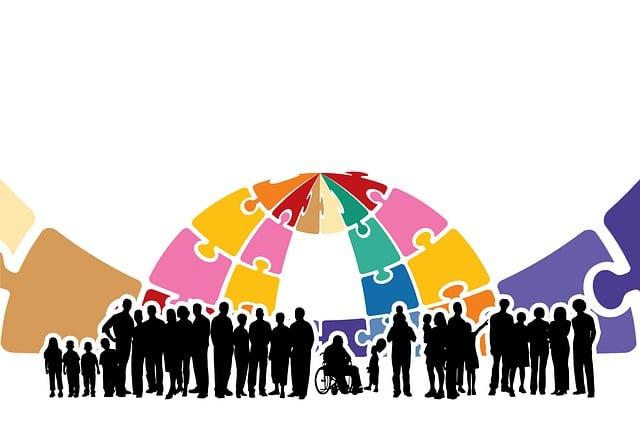In the heart of South Asia lies Pakistan, a vibrant tapestry woven from diverse cultures, languages, and histories. Yet, beneath its rich exterior lies a pressing challenge that shadows its progress: social inequality. As economic disparities deepen and social stratifications become more pronounced, the call for justice reverberates through the nation’s streets, echoing the aspirations of millions seeking equal opportunities and rights. This article delves into Pakistan’s multifaceted struggle against inequality, exploring the efforts of activists, policy makers, and everyday citizens who are united in their pursuit of a fairer society. By examining historic movements, contemporary initiatives, and the resilience of communal bonds, we aim to illuminate the path towards a more equitable future for all Pakistanis. Join us as we confront the complexities of social justice and the enduring spirit of a nation on the brink of transformation.
Emerging from Shadows: Understanding the Landscape of Inequality in Pakistan
In the intricate tapestry of Pakistan’s society, inequality is often woven into the very fabric of everyday life. This complex issue manifests itself through various dimensions, including economic disparity, education gaps, and gender inequality. The Urban-Rural divide remains stark, with the vast majority of wealth accumulating in the urban centers while rural areas struggle with limited access to basic resources. This situation is exacerbated by systemic barriers that hinder marginalized communities, particularly women, from achieving social mobility. The struggle for equality is not merely a political issue; it is a battle for survival, dignity, and the transformative power of education that can uplift entire communities.
Addressing inequality demands a multifaceted approach, bringing together government action, civil society engagement, and global partnerships. Community-driven initiatives have emerged as champions of change, working tirelessly to foster inclusivity and break down the institutional barriers that prevent progress. Key strategies include:
- Policy Reform: Advocating for equitable policies that prioritize social justice.
- Access to Quality Education: Ensuring that education is accessible to all, irrespective of socio-economic status.
- Empowerment Programs: Supporting women and youth through skill development and entrepreneurship opportunities.
To further illustrate the pressing nature of these issues, the following table highlights some critical indicators of inequality in Pakistan:
| Indicator | Urban Areas | Rural Areas |
|---|---|---|
| Literacy Rate | 85% | 59% |
| Female Employment Rate | 35% | 12% |
| Poverty Rate | 20% | 40% |

Empowering the Marginalized: Strategies for Inclusive Economic Growth
To foster a more equitable society, it is crucial to devise targeted strategies that uplift marginalized communities within Pakistan. Engaging these communities necessitates robust frameworks that prioritize skills development and entrepreneurial opportunities. A multi-stakeholder approach can include:
- Access to Education: Ensuring that individuals from marginalized backgrounds receive quality education tailored to market needs.
- Microfinance Initiatives: Providing financial resources to enable small business start-ups which can lead to sustainable local economies.
- Mentorship Programs: Connecting disadvantaged individuals with mentors who can guide them in personal and professional growth.
Moreover, promoting inclusive policy-making is essential in addressing systemic barriers. Policymakers should work towards creating environments where marginalized voices can be heard, thus contributing to their own sustainable development. This can be effectively achieved through:
- Community Engagement: Involving local populations in decision-making processes that affect their lives.
- Public-Private Partnerships: Collaborating with businesses to create job opportunities tailored to the capabilities of locals.
- Awareness Campaigns: Raising public awareness around the significance of diversity and inclusion in economic activities.

Education as a Catalyst: Reforming the System for Equitable Opportunities
In the ongoing quest for social justice, education serves as a pivotal instrument that can dismantle the barriers of inequality. By advocating for reform within the educational framework, we can ensure that every child, regardless of their socio-economic background, has access to quality learning experiences. Investing in infrastructure, training teachers, and expanding curriculum to include critical thinking and life skills should be prioritized. In such a reformed system, students from all walks of life can thrive, thus unearthing potential that is often stifled by systemic obstacles.
The road to equitable opportunities is paved with commitment and collaboration. As stakeholders—government, educators, and communities—band together to tackle these complex challenges, several strategic approaches can facilitate meaningful change. Consider implementing:
- Incentives for Schools: Reward institutions that achieve significant improvements in student outcomes.
- Community-Based Programs: Foster partnerships that provide after-school tutoring and mentorship.
- Scholarship Opportunities: Increase funding for marginalized students to pursue higher education.

Forging Partnerships: The Role of Civil Society in Advocating for Social Justice
The fight for social justice in Pakistan has seen a remarkable evolution, largely driven by the relentless efforts of civil society organizations. These entities serve as vital intermediaries, amplifying the voices of marginalized communities and ensuring their challenges are recognized at both local and national levels. Through grassroots campaigns and partnerships with various stakeholders, including governmental and international organizations, civil society acts as a catalyst for change. Their advocacy work often highlights critical issues such as poverty, gender inequality, and access to education, pushing for policies that prioritize social equity.
Moreover, collaboration among civil society groups, activists, and community leaders fosters a comprehensive approach to addressing systemic injustice. Through initiatives like community awareness programs and policy dialogues, they empower individuals to stand up for their rights and demand accountability from their leaders. Key strategies include:
- Network Building: Creating alliances among different organizations to strengthen advocacy initiatives.
- Capacity Enhancement: Training community members in legal literacy and civic engagement.
- Resource Mobilization: Securing funding to support social justice programs and campaigns.
These partnerships not only bring diverse perspectives to the table but also increase the effectiveness of their initiatives, ultimately contributing to a more equitable society. The synergy created through these collaborative efforts has proven essential in confronting the myriad challenges of inequality in Pakistan, paving the way for a more just future.
Insights and Conclusions
As Pakistan navigates its path toward social justice, the road ahead remains fraught with challenges. The fight against inequality is not simply a battle for economic equity; it is a quest for dignity, recognition, and the empowerment of every citizen. Through grassroots movements, policy reforms, and international solidarity, voices that were once marginalized are beginning to resonate with clarity and purpose.
The journey toward a more just society is rarely linear, and it demands the concerted effort of all segments of society — from policymakers to community leaders, activists to everyday citizens. With each small victory, the nation takes a step closer to breaking the chains of systemic injustice and fostering a culture that values inclusivity over exclusion.
In the rich tapestry of Pakistan’s narrative, the fight for social justice stands as both a challenge and an opportunity. As the country grapples with its past while shaping its future, the commitment to confronting inequality may well define not only the lives of its people but also the legacy of the nation itself. The battle is ongoing, and with it, the promise of a fairer, more equitable Pakistan beckons. Only time will reveal how far this spirit of resistance and resilience can carry the nation, but the dedication to this cause remains a beacon of hope for many.



